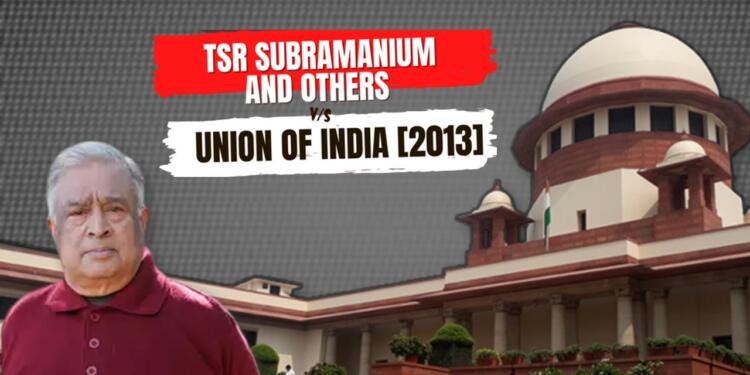Subramanian & Ors Vs Union of India and Ors: In a democracy, the role of the bureaucracy is to act as a bridge between the legislators and the populace. The bureaucracy carries out the legislative wisdom to the implementation stage. Thus, to carry out effective discharge of responsibilities, the legislators are bestowed with political authority to manage the functioning of the bureaucracy. The bureaucratic system has its own flaws; despite that the major issue arises owing to the unchecked interference of the political masters.
The bureaucrats are well trained to differentiate between legitimate political orders and orders which are improper, motivated and perverse. The political setup expects the civil servants to faithfully serve the government of the day. However, there have been numerous instances where the bureaucrats have stood up to the political masters at the great cost to their careers.
The issues of transfer posting, below the table transactions, carrying out unofficial dictums are major fallacies of the democratic setup that needs to be checked. Therefore, in an endeavor to loosen the shackles of the bureaucracy from political control, the Apex Court issued significant directives in the case of T. S. R. Subramanian & Ors Vs Union of India and Ors.
Also read: Ryan International School Case: The guiding document of Juvenile Justice Act
S. R. Subramanian leads the Bureaucratic Battle
The Supreme Court was approached by way of ‘public interest litigation’, by a group of retired bureaucrats who carried forward the bureaucratic cause even after their retirement. In this ground-breaking petition, filed by former Union Cabinet Secretary T.S.R. Subramanian and 80 other retired bureaucrats, the Apex Court mandated fixed tenure to the bureaucrats by directing the Centre and State governments to set up independent Civil Servants Boards (CSBs) to deal with the transfers and promotion of and enquiries or disciplinary actions against bureaucrats.
The Supreme Court, in this famous verdict, noted the decay in ‘standards of probity and accountability’ of civil servants due to ‘unchecked political influence’. The Apex court ruled that the bureaucrats are not obligated to ‘function on verbal or oral instructions given by their superiors and political executive’. The move of the judiciary is aimed at tackling ‘favoritism and corruption’ owing to political subjugation of the bureaucracy.
Also read: The Jan Vishwas (Amendment of Provisions) Bill, 2022: The bill which truly justifies its name
Factual Backdrop of the Case
The Bench comprising Justice K.S. Radhakrishnan and Justice Pinaki Chandra Ghose was asked to look into the perils of excessive political interference in the functioning of the bureaucracy. In the instant petition Article 32 of the Constitution has been invoked by 83 eminent retired civil servants highlighting the necessity of various reforms for preservation of integrity, fearlessness and independence of civil servants at the Centre and State levels in the country.
Prayers made in this writ petition are based on various reports and recommendations made by several Committees appointed for improving the public administration. The key aspects of the petition aimed at issuance of directions to create an “independent” Civil Service Board or Commission both at the Centre and the State based on recommendations of the Hota Committee, 2004.
Further, to provide fixed tenure for civil servants ensuring stability based on the recommendations of the Jha Commission 1986, the Central Staffing Scheme, 1996, the 2nd Administrative Reforms Commission (10th Report), and the Hota Committee Report, 2004.
In addition, to make it mandatory for the civil servants to formally record all such instructions/directions/ orders/suggestions which he/she receives, not only from his/her administrative superiors but also from political authorities, legislators, commercial and business interests and other persons/quarters having interest, wielding influence or purporting to represent those in authority based on the principles recognized by Rule 3(3)(ii)(iii) of the All India Service Conduct Rules, 1968 and as implicitly recognized by the Santhanam Committee Report, 1962.
Also read: Indian IT Act must be amended to curb the excess of big corporations
Dictum of the Apex Court
The Division Bench of the Supreme Court observed that the civil servants are not having stability of tenure, particularly in State Governments where transfers and postings are made frequently, at the whims and fancies of the executive head for political and other considerations and not in public interest. Therefore, the Hon’ble Court provided for the establishment of a Board to look into transfer and posting of civil servants.
Further, the Bench held that all communication given to civil servants must be in written form so as to protect them “against wrongful and arbitrary pressure exerted by the administrative superiors, political executive, business and other vested interests”.
The Court was of the view that ‘by acting on oral directions, and not recording the same, the rights guaranteed to the citizens under RTI Act, could be defeated. Therefore, the existing practice of giving oral directions/instructions by the administrative superiors, political executive etc would defeat the object and purpose of the RTI Act.
Also read: Money Bill: All the times, Aadhaar was discussed in Supreme Court
Thus, to tackle favoritism and corruption the Apex Court held that ‘recording of instructions and directions is necessary for fixing responsibility and ensuring accountability in the functioning of civil servants and to uphold institutional integrity and the bureaucracy should refrain from taking oral orders. Further, expressing the need for CSB, the Bench observed that “of late, the UPSCs and PSCs are being denuded of their powers of consultation while making promotions and transfer from one service to another.”
Thus, proscribing frequent shuffling and transfer of the civil servants, the Apex Court gave a progressive verdict in Subramanian & Ors Vs Union of India and Ors to ensure “Minimum assured service tenure” is provided to civil servants so as to provide them with ample opportunities to prioritize the effective implementation of the social and economic measures for the betterment of poor and marginalized sections of the society.
Support TFI:
Support us to strengthen the ‘Right’ ideology of cultural nationalism by purchasing the best quality garments from TFI-STORE.COM
Also Watch:
https://www.youtube.com/watch?v=BVX29pXH4DQ



























